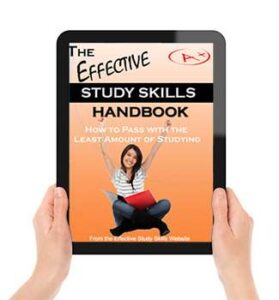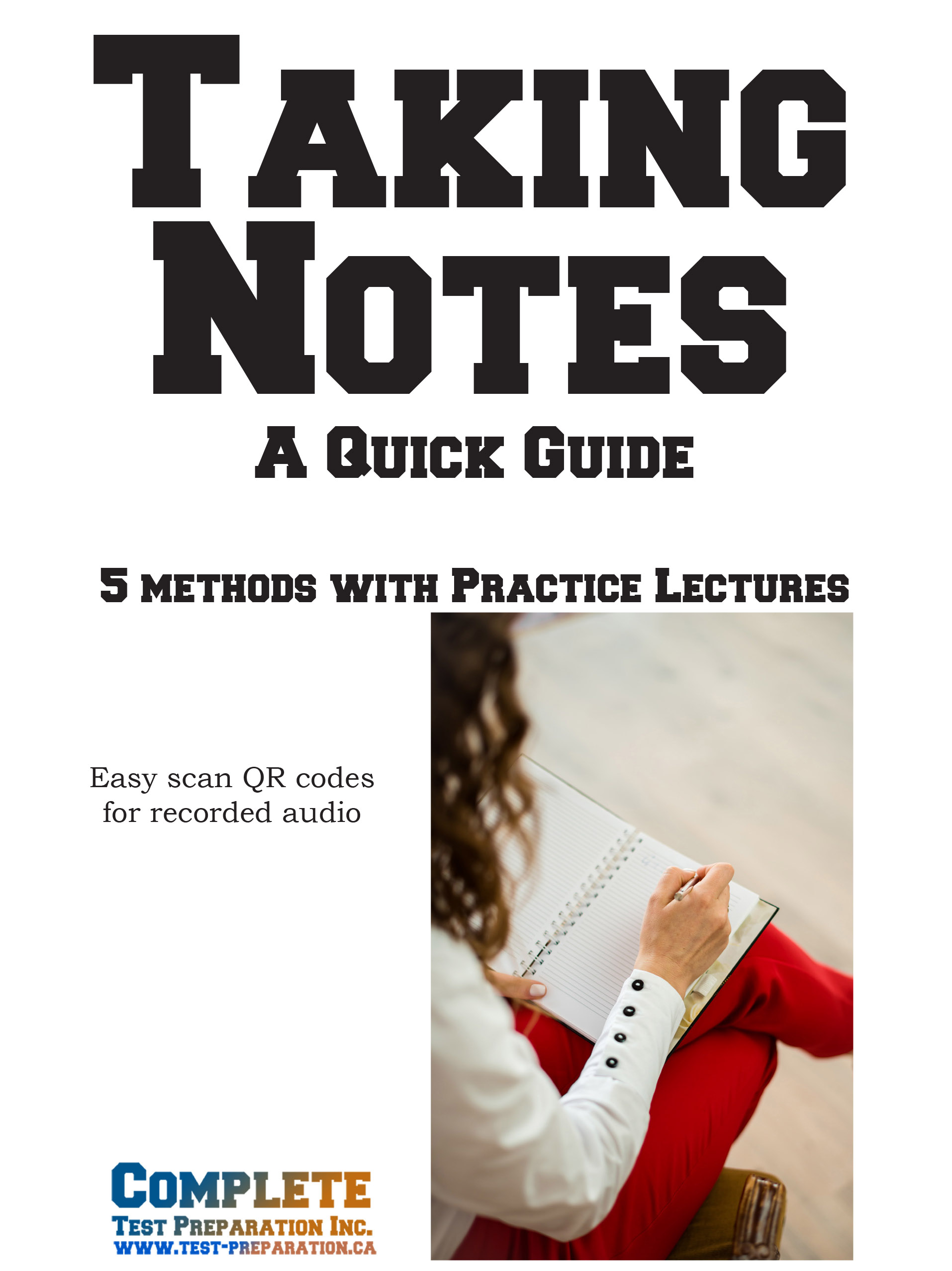Test Anxiety Tips!
- Posted by Brian Stocker MA
- Date August 17, 2010
- Comments 7 comments
The Complete Guide to Overcoming Test Anxiety
Audio Version of this Post
What is Test Anxiety
Test anxiety is not something dreamed up by students to explain why they do so poorly in their classes. It’s a recognized psychological phenomenon. Specifically, it’s a form of the psychological condition known as ‘performance anxiety.’ It’s described as a flight or fight reaction to people as they perform either in public or for others to evaluate.
Don’t worry though. Just because you experience test anxiety doesn’t mean you’re psychologically imbalanced. In fact, performance anxiety is experienced by most people at some time in their lives.
As with other forms of performance anxiety, test anxiety is your body’s reaction to a stressful situation. Any time you’re under stress, the body releases adrenaline. Adrenaline is a hormone that prepares your body for danger. Adrenaline causes symptoms such as pounding heart, sweating, rapid breathing and sweaty palms.
These symptoms interfere with basic thinking processes, such as remembering, problem solving and analyzing. In other words, test anxiety is often a self-fulfilling prophecy. You worry that you won’t do well on the test, and this triggers adrenaline. The adrenaline causes the symptoms such as the rapid breathing and fast heartbeat, which in turn interfere with clear thinking.
When these symptoms are present, basic thinking processes like remembering, analyzing, and problem solving are affected. That is the reason that students who experience test anxiety feel that their brain is not working right.
The biological state of anxiety evolved for good reason. Its purpose is to keep your body vigilant and ready to fight or run if you must. However, our biological evolution has not kept up with rapid changes in society. The adrenaline rush was meant give extra energy when your life is in danger, not put you on high alert before your college exam.
Another important cause of test anxiety is the worry about how others will perceive you if you do poorly on the exam. A student who regularly experiences test anxiety tends to be the one who puts a lot of pressure on him or herself to perform well. They feel they must do well to make parents happy or to maintain their status as the smart one in the class. One less-than-perfect grade is a blow to their self-confidence, which causes more test anxiety.
The Procrastination Connection
Most students who have a problem with test anxiety also have problems with procrastinating. This is not a coincidence. Our natural reaction when danger is perceived is to avoid the situation. So even though it’s not logical, when the deep-seated emotions sense that the upcoming test presents danger, the mind’s response is to avoid the issue altogether. Studying for the test is the logical thing to do, since this is what will help the student do well on the test; but on an instinctual level, the person wants to run away from anything pertaining to the test.
This just adds to the self-fulfilling prophecy we talked about earlier. The student does not want to study for a test that he or she thinks is going to be difficult. So, when he finally gets around to studying for it, adrenaline is released, and this interferes with studying and with taking the test. The procrastinator inevitably waits until the last possible minute to study, and this makes the test anxiety at exam time even worse.
This means, of course, that a perfectionist is more likely to have problems with test anxiety than the non-perfectionist. The perfectionist finds it hard to accept mistakes he or she might make, which releases the adrenaline that interferes with his or her performance during the test. More on Procrastination.
How to Handle Test Anxiety
The Most important tip – Take care of yourself.
Studying and taking tests uses serious brain power so you want your mind operating at its sharpest. This means looking after yourself physically, mentally and emotionally.
Physical Preparation
Staying healthy can help you stay focused on the course material. Cramming and caffeine are OK if that is the only option, but it is not the easier or recommended option. Eat healthy and eat foods that keep your blood-sugar level stable: fruit, vegetable, grain and protein.
Stay hydrated. Drink lots of water. This sustain energy and focus. Remember cola, alcohol and caffeine dehydrate. Drinking straight water is best.
Reduce alcohol and caffeine. Caffeine actually makes you jittery, which is not conducive for concentrating.
Keep your body moving. Hours of studying take a toll on the body. Exercise improves your mood, energy level and concentration. Exercise during your normal workout time is great but that is not enough. After you’ve been studying for a while, stop for a few minutes of exercise. A five-minute walk after you’ve been studying for a while is rejuvenating.
Get enough sleep. It’s easier for you to retain information if you keep a regular, healthy sleep schedule. College and University can be crazy and it isn’t always possible to get a full eight hours – do the best you can!
Take breaks. Reward yourself by doing something special for yourself. You might check your Facebook account or eat a bowl of ice cream.
Mental Preparation
Visualize yourself doing well. This means that you need to make yourself believe that you will do well and pass the test. If you spend your energy thinking about yourself failing, you create more anxiety. More anxiety makes it less likely that you’ll do well on the exam. So, you create a self-fulfilling prophecy. Staying positive and thinking about how great you’re going to do, will reduce anxiety.
Being positive and boosting your confidence is one thing – but don’t become over confident. A little anxiety is good and over confidences can cause you to become careless.
Watch Self Talk. Pay attention to what you’re thinking, both as you’re studying and as you’re taking the exam. Learn to immediately recognize any negative thoughts (I’ll probably bomb the multiple-choice section) and force yourself to stop the thought in mid-stream. Replace these negative thoughts with positive ones: I know this material, so the multiple-choice portion will be a breeze.
Keep your mistakes in perspective. This is both important yet difficult, especially for the perfectionist. However, you must remind yourself regularly that everybody makes mistakes and nobody is great at everything. Learn to think of mistakes as learning opportunities. One boy, for instance, was in a third-grade spelling bee and was eliminated for spelling the word business wrong. Forty years later, he says he has never spelled business as business ever again, all because he learned from a mistake.
Ask for help. Be willing to ask for help. While a little anxiety can serve as a positive signal to act, too much of it will cause you to perform poorly on the test. It’s better, instead, to get some help. Seek out a tutor or, if your professor is open to this kind of thing, speak directly to him about the issue. If you are taking a College exam or High School tests, go to the Counseling center. If nothing else, make plans well in advance to study with a group of friends; this goes a long way toward alleviating the stress that accompanies test anxiety.
Emotional Preparation
Get Happy! Or at least not sad! For many students, college life is a roller coaster of depressed emotions, so, getting yourself happy the week of the test is a great strategy to help you do well on the test. So, indulge in something the week of the test and avoid depressing situations, this way you will be in the right mind set for the test.
Deal with Anger before the test. It does not matter if you are angry with your roommate or test instructor; tell your self that it is not worth losing good marks on your test.
Don’t Fight Reality. Yes, standardized tests favor certain types of students and yes, they may not be the best measure of your knowledge and ability. None of that matters right now because you must take the test and it will count toward your final grade. Deal with it!
Breathing Exercises to Relieve Test Anxiety
Breathing exercises are one of the best ways to relive stress. You can do them sitting down and they will relax you quickly before you start your exam.
I AM exercise. Inhale slowly, and as you do so, say to yourself, “I AM. . .” Now exhale slowly, and complete the sentence, “. . .relaxed.” Do this several times until you feel the anxiety leaving you. Here are some breathing exercises from Dr. Andrew Weil.
Stimulating breath. This exercise is especially good before a test, because it relaxes, raises your vital energy level and increases your alertness. Sit upright and close your mouth (but keeping it relaxed). Now inhale and exhale in short, quick bursts, through your nose. Each inhale and exhale should last only about a half second. Keep them spaced evenly. This produces a rapid movement of your diaphragm. Suggestion: Do this in the back of the class, when not many people are around, or they’re likely to think something’s wrong with you. Do this exercise only for about 20 or 30 seconds. If you do it right, you should feel invigorated and free of stress.
Relaxing breath. This one is super-simple to do while sitting in a classroom chair. Sitting straight up, place the tip of the tongue to it touches the ridge of tissue behind the top front teeth. Keep it there during the entire exercise. Purse your lips slightly. Now exhale completely through the mouth; you should feel a “whoosh” go out of your mouth. Now close your mouth and breath in quietly through the nose, counting to four in your head. Now hold until you count to seven. Return your mouth to a slight pursing of the lips and exhale through the mouth, again generating the “whoosh,” to a mental count of eight. This entire motion counts as one repetition. Do it again three more times. Remember: quiet breaths in through the nose and “whooshing” breaths out through your mouth, with the tip of your tongue remaining in the same position. This exercise acts as a natural tranquilizer. If you feel a bit lightheaded as you do the exercise, don’t worry; it’ll pass.
Breath counting. Sit in your chair, with your spine straight and with your head slightly inclined forward. Close your eyes and take a few deep breaths. Let the breaths be exhaled without attempting to influence it. The exhale should be slow and quiet. Now start the exercise by counting to “one” while exhaling. The next exhale is “two,” the next one, “three,” the next one “four,” and then “five.” After you reach five, start a new cycle, beginning at “one” again. Remember to count only when exhaling. Try to do this for about 8 or 10 minutes before the start of the test, and you should be fully relaxed and yet alert.
Okay, break time is over. Pull out the text and your class notes and let’s ace a test!
Online Relaxation Exercises and Resources
Relaxation
Several relaxation exercises with detailed description and instructions Hobart and William Smith Colleges
Detailed description of different types of anxiety – plus muscle relaxation exercises, breathing exercises, meditations and books. Videos and downloads – see Other Resources – Marquette University
Progressive muscle relaxation video U. of Texas
Meditation
Free guided meditations in English and Spanish – UCLA
The Meditation Podcast
Guided Medications and other resources – Health Journeys: Resources for Mind, Body, & Spirit
Yoga

How to Study

… without endless hours of cramming
… without the need for tutoring
… and without sacrificing the things that matter to you!
Multiple Choice Secrets!

How to Take Notes
Learn 5 Note Taking Methods – With Full Explanation and Examples!
Taking notes is an essential academic skill and you will be doing a LOT!
Learn More and Start Practicing
Date Published: Tuesday, August 17th, 2010
Date Modified: Friday, November 14th, 2025
You may also like
Five-Day study plan – Ready for Blast Off Day!
Going into my senior year, one could assume that I am well experienced in the subject of test-taking, yet if anything, life has taught me that one can always learn more. My recent conversation with a friend helped me to …
How to Take a Test — the Basics How to Take a Test – 2 Common Mistakes on a Test – and how to avoid them! Written by, Brian Stocker MA., Complete Test Preparation Inc. Date Published: Monday, March 4th, …
What your Professor wants to see on your Exam
1. Get to know your instructors. Introduce yourself so that they know you and are aware that the course is vital to you. Make yourself visible – sit near the front of the class and attend regularly. 2. Give feedback. Everyone needs …


7 Comments
I have been in this situation before but fortunately I have overcome it. Based on my experiece, I have found that certain homeopathic treatments, natural foods and remedies can be very effective at helping to balance the body to alleviate anxiety and stress symptoms.
Yes, herbal and other homeopathic and aminoes such as GABA and L-Theanine are excellent. BUT – you will definitely want to try these out a couple of times BEFORE the exam so you are familiar with them. Taking a big exam is not the time to test out new herbal or other supplements!
I prepare well for my exam but as soon as the exam day approaches i become overwhelmed with dread and fear that i will flunk it. i end up forgetting easy answers only to remember them as soon as the exam is over. i will certainly try out your suggestions.
thanks for the post, i hope this helps me overcome the anxiety that i get sometimes.
I came across this post while looking for study guide for cpat, I went to check this school and now I have a test tomorrow Yak Im so nerves. I know I wont sleep tonight worring about the test. I always said that I have test anxiety but now that I’m reading your post I know I do. Thank you for your useful info.
Wonderful post. I mean truly exceptional. However, the loading was quite long.
Took not less than 40 seconds for the page to load.
The information was worthwhile, but still, you might want to check into that.
Almost every woman in the study exhibited the same pattern.
This is what anxiety disorders are all about and to
say that they are unpleasant is like saying nothing at all.
There are many factors which are involved in anxiety disorders.
From time to time we all worry about things but for others worrying about certain things can become more of an issue and
turns into anxiety.